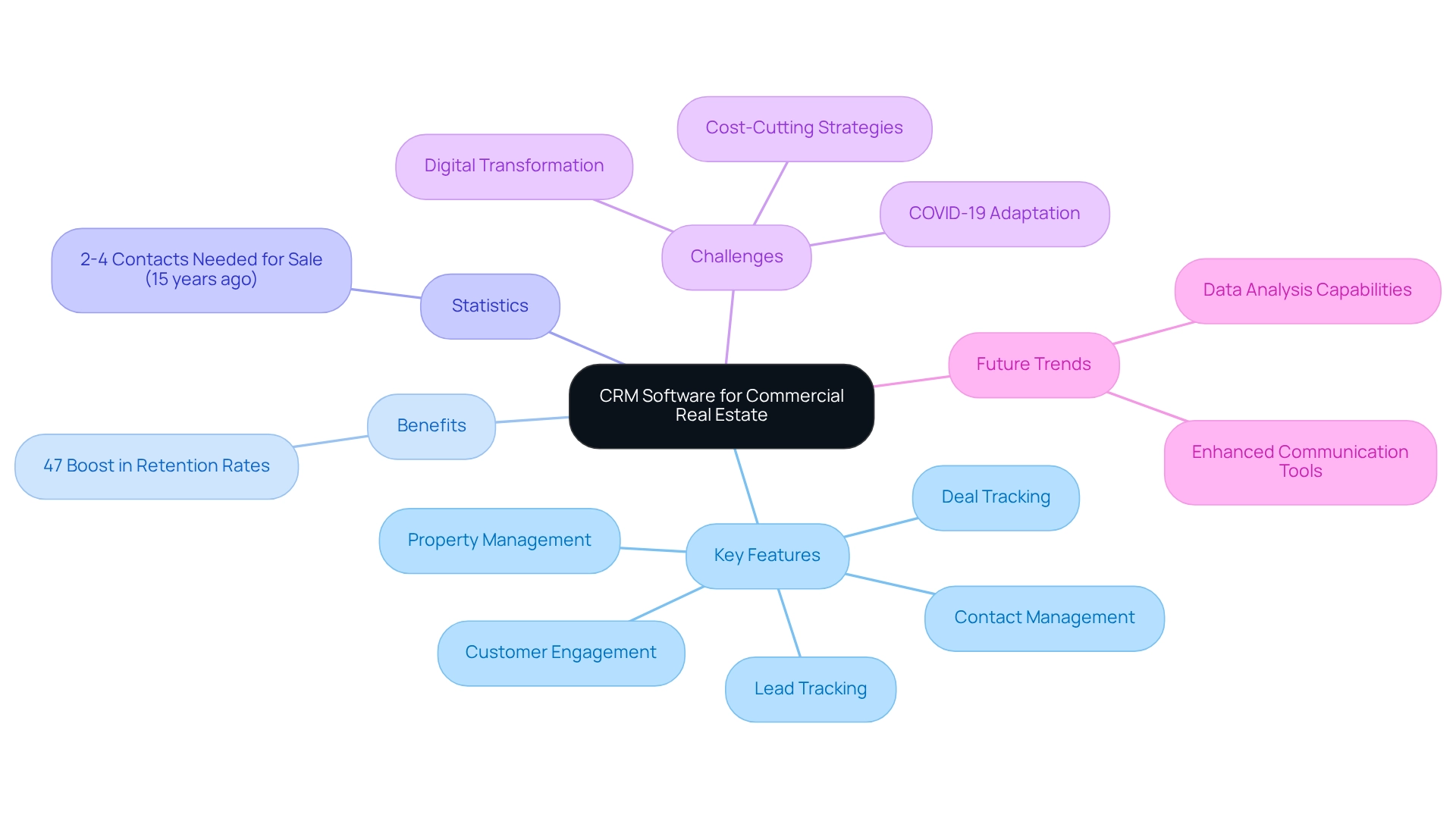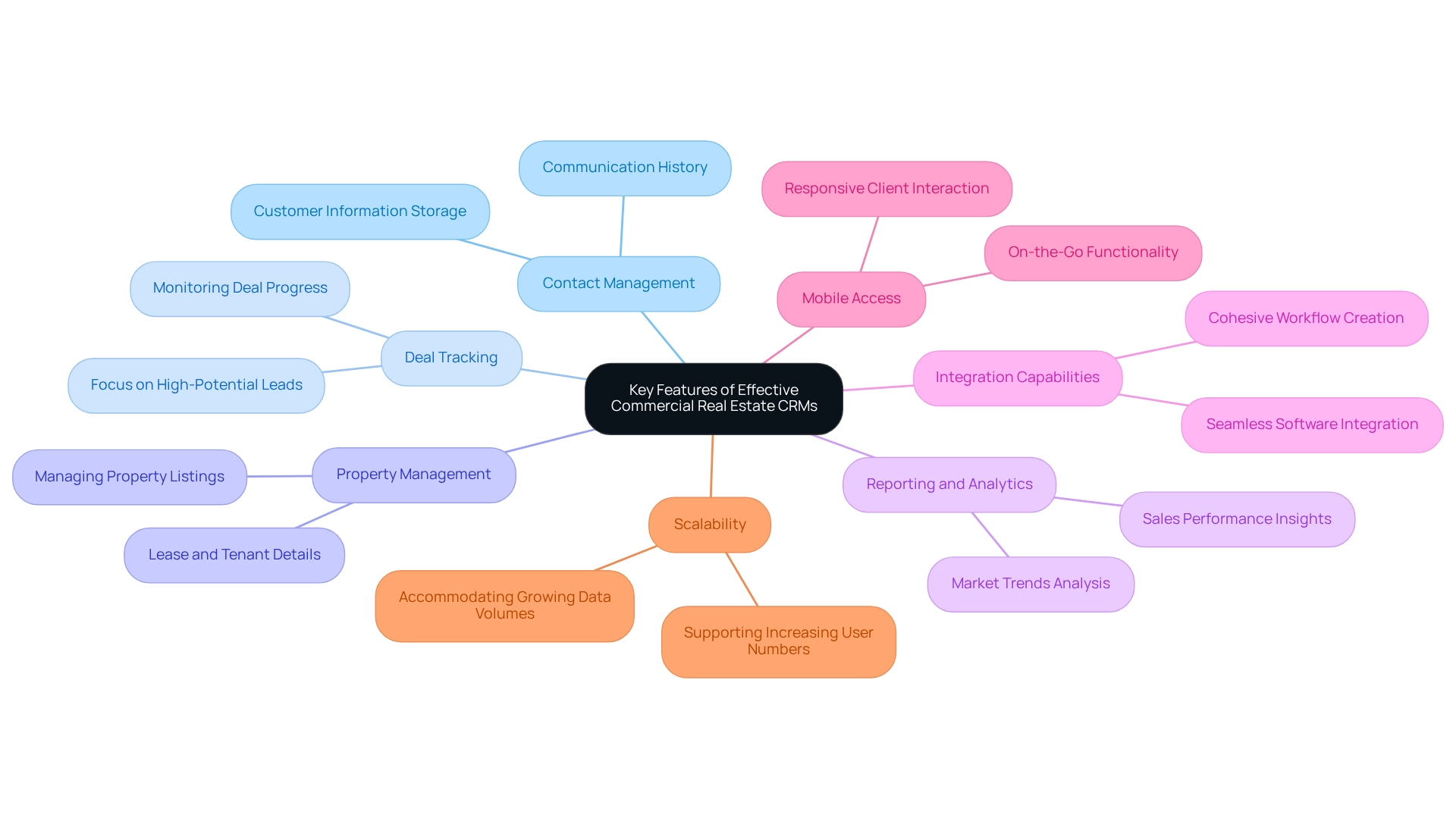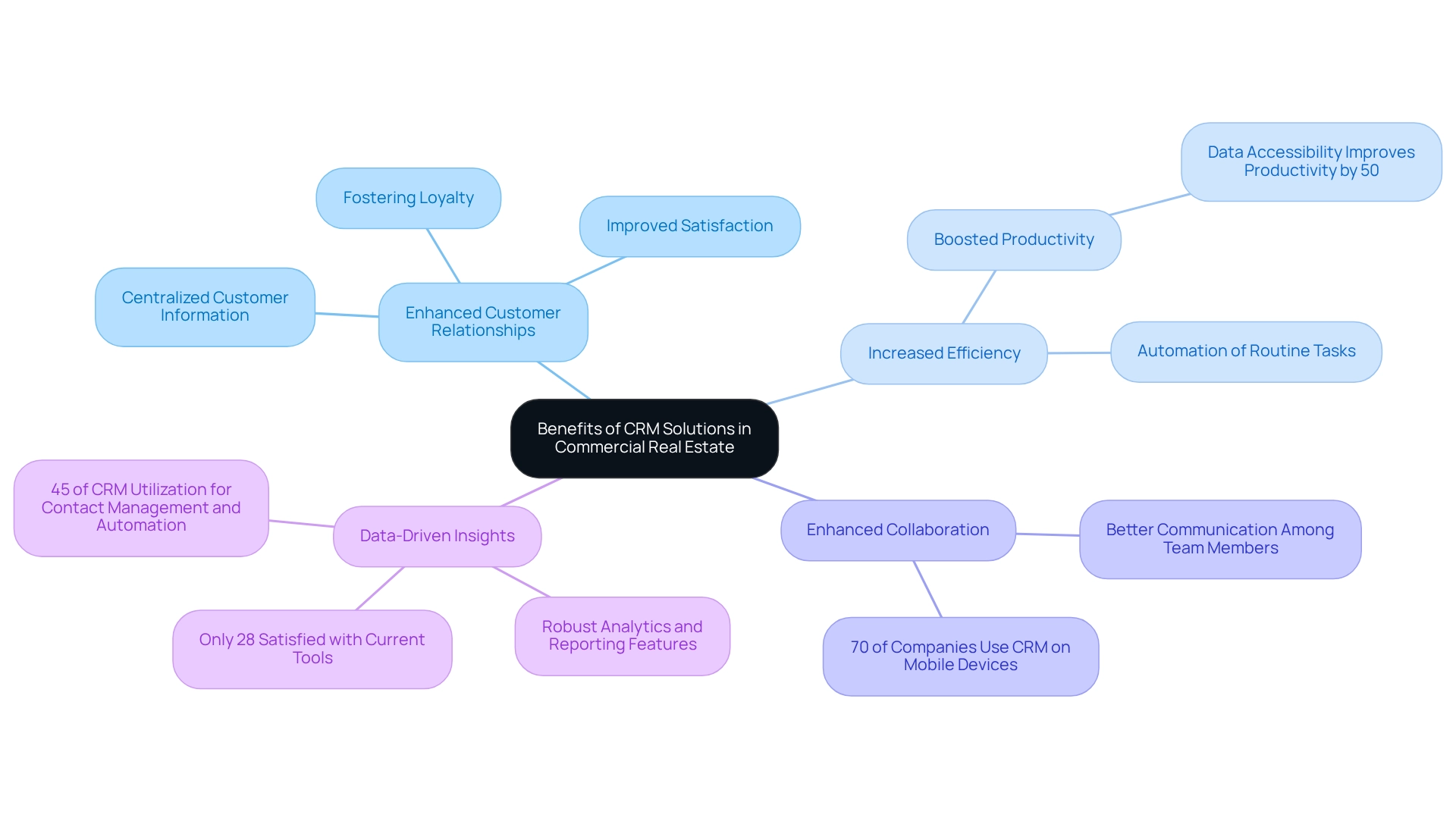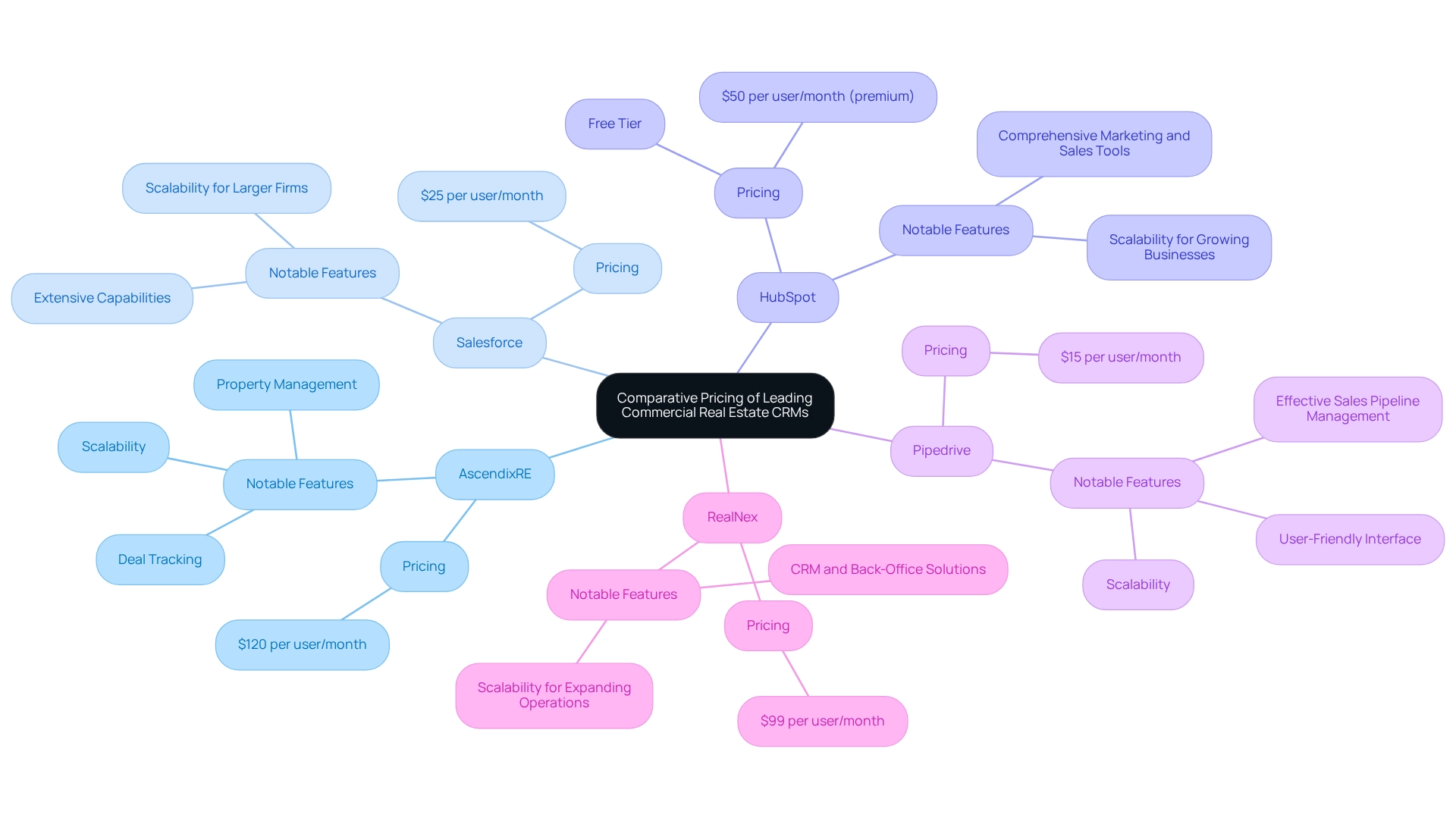Overview
This article presents a comparative analysis of CRM software specifically tailored for commercial real estate, highlighting its distinctive features, benefits, and pricing structures. Effective CRM systems are shown to enhance operational efficiency, improve customer relationships, and adapt to market changes. Notably, statistics reveal that businesses utilizing these tools experience improved retention rates and increased productivity. Such insights are crucial for stakeholders looking to optimize their investment strategies.
Introduction
In the competitive realm of commercial real estate, the right tools can make all the difference. Customer Relationship Management (CRM) software, specifically designed for this sector, is revolutionizing how professionals manage client relationships, streamline operations, and enhance communication. Unlike generic CRM systems, these specialized solutions cater to the unique challenges of commercial real estate, offering functionalities such as:
- Deal tracking
- Property management
- Advanced analytics
As the industry adapts to changing market dynamics and increasing client expectations, understanding the benefits and features of effective CRM systems has never been more critical. This exploration delves into the essential aspects of CRM software, showcasing how it empowers real estate professionals to forge strong connections and drive business success.
Understanding CRM Software for Commercial Real Estate
CRM software for commercial real estate is essential for optimizing operations, managing customer relationships, and enhancing internal communication within organizations. Unlike conventional CRM systems, this CRM software for commercial real estate addresses the distinct needs of commercial property professionals by incorporating functionalities such as property management, deal tracking, and customer engagement. Key features encompass contact management, lead tracking, and seamless integration with property databases—vital for navigating complex transactions and fostering robust relationships.
As the landscape of commercial property evolves, the relevance of CRM software becomes increasingly pronounced. Recent statistics reveal that businesses leveraging CRM systems witness an impressive 47% boost in retention rates, highlighting the critical role of effective customer management. Furthermore, it is significant to note that 15 years ago, an average of 2 to 4 contacts were necessary to finalize a sale, illustrating how CRM systems can streamline this process and enhance sales efficiency.
Moreover, the competitive arena of CRM software has adapted to challenges such as the COVID-19 pandemic, prompting firms to embrace digital transformation and implement cost-cutting strategies to maintain agility. Insights from the case study titled 'Competitive Landscape of Commercial Real Estate CRM Software' demonstrate how companies have recalibrated their strategies using CRM software for commercial real estate in response to these challenges, ensuring they remain competitive in a swiftly changing market.
Looking ahead to 2025, the latest trends in CRM for the property sector underscore a shift towards enhanced communication tools and data analysis capabilities, empowering companies to respond swiftly to market fluctuations and customer expectations. Expert insights emphasize that CRM software transcends being merely a tool; it serves as a strategic resource that equips property professionals to cultivate and sustain strong relationships. As Vince Lombardi famously stated, "The only place success comes before work is in the dictionary," underscoring the necessity of diligent effort in leveraging CRM systems to drive success in a competitive market.

Key Features of Effective Commercial Real Estate CRMs
Effective crm software for commercial real estate is characterized by several essential features that significantly enhance operational efficiency and client relationships.
-
Contact Management: A comprehensive system for storing and organizing customer information ensures easy access to contact details and communication history. This functionality is crucial for maintaining strong customer relationships and enhancing engagement.
-
Deal Tracking: Tools that enable users to monitor the progress of deals from initial contact to closing streamline the sales process. This feature allows agents to focus on high-potential leads, thereby improving conversion rates.
-
Property Management: Integrated features that assist in managing property listings—including details about leases, tenants, and maintenance schedules—simplify the property management process. This capability enables agents to present listings effectively and manage their inventory with ease.
-
Reporting and Analytics: Advanced reporting tools provide insights into sales performance, client interactions, and market trends. CRM systems can offer valuable insights into property performance and buyer interest, empowering property professionals to make data-driven choices that enhance their strategic planning.
-
Integration Capabilities: The ability to seamlessly integrate with other software systems, such as accounting tools and marketing platforms, is vital for creating a cohesive workflow that enhances productivity.
-
Mobile Access: Mobile-friendly interfaces that enable users to access CRM functionalities on-the-go are essential for property professionals who often work outside the office. This flexibility ensures that agents can remain connected and responsive to client needs at all times.
-
Scalability: As the property sector continues to evolve, the scalability of CRM solutions becomes increasingly important to accommodate growing data volumes and user numbers. This ensures that as businesses expand, their CRM systems can grow alongside them.
To illustrate the impact of these features, consider the case study on automation features that streamline workflows. By automating lead capture and follow-up tasks, agents can prioritize high-potential leads, thus enhancing their chances of conversion and streamlining their sales processes.
As Thomas Edison once said, "Opportunity is missed by most people because it is dressed in overalls and looks like work." Identifying and employing crm software for commercial real estate features can help property professionals capture opportunities in the market.
By utilizing these essential characteristics, property professionals can significantly improve their operational effectiveness and customer interaction.

Benefits of Implementing CRM Solutions in Commercial Real Estate
Implementing CRM software for commercial real estate offers a multitude of significant benefits that cannot be overlooked, including enhanced customer relationships by centralizing customer information and interaction history, which empowers real estate professionals to provide personalized service, leading to improved satisfaction and fostering loyalty. This approach is essential, as effective customer management can pave the way for long-term collaborations and repeat business.
Increased Efficiency: The automation of routine tasks, such as follow-ups and reporting, enables teams to focus on high-value activities. This shift not only boosts productivity but also enhances overall operational effectiveness. Studies indicate that easy access to data can improve productivity by up to 50%, highlighting the critical role of data accessibility in driving efficiency.
Enhanced Collaboration: CRMs facilitate better communication and collaboration among team members, ensuring alignment regarding client interactions and deal progress. Notably, 70% of businesses utilize CRM systems to access customer information on mobile devices, which enhances decision-making for property professionals who often work on-site. Such a collaborative environment is vital for navigating the complexities of real estate transactions.
Data-Driven Insights: With robust analytics and reporting features, CRMs deliver valuable insights into market trends and consumer behavior. This data-driven approach empowers firms to make informed strategic decisions, especially given that only 28% of organizations express satisfaction with their current tools for creating a centralized customer view. CRM software for commercial real estate is essential in addressing this dissatisfaction and enhancing relationship management, as it streamlines operations by integrating various functions into a single platform, thereby reducing the need for multiple software solutions. This simplification not only lowers operational costs but also enhances the overall efficiency of business processes. Over 45% of CRM utilization focuses on contact management and automation, underscoring the critical role these tools play in optimizing procedures in property transactions.
The adoption of CRM solutions is particularly crucial in 2025, as the demand for improved customer relationships and operational efficiency continues to rise. As companies increasingly rely on CRM software for commercial real estate, the impact on client satisfaction and relationship management becomes evident, making this software indispensable for commercial property professionals.

Comparative Pricing of Leading Commercial Real Estate CRMs
When assessing CRM software for commercial real estate options, it's essential to recognize that pricing can vary significantly based on features, user count, and service levels. High-quality plans for property CRMs often exceed $59 per user each month, providing context for the pricing of the mentioned CRMs. Here is a comparative overview of some leading CRMs:
- AscendixRE: Starting at approximately $120 per user each month, this CRM is specifically designed for commercial property professionals, offering features such as deal tracking and property management. Its scalability makes it suitable for firms managing increasing data.
- Salesforce: Known for its extensive capabilities, Salesforce pricing begins around $25 per user per month, but costs can escalate with additional features and customizations. Its scalability features are particularly beneficial for larger firms.
- HubSpot: This platform offers a free tier with basic functionalities, while premium plans commence at $50 per user per month, providing a comprehensive suite of marketing and sales tools. HubSpot's scalability positions it as a viable option for growing businesses.
- Pipedrive: Starting at $15 per user per month, Pipedrive is favored for its user-friendly interface and effective sales pipeline management features. It is also scalable, accommodating various business sizes.
- RealNex: Merging CRM functionalities with back-office solutions, RealNex pricing starts at around $99 per user per month. Its scalability is a critical feature for firms looking to expand their operations.
As Brett Day, Senior Staff Writer, observes, "To ensure that a CRM platform will work for you, look closely at the features page of each provider’s website to see if the tools you need are available in the plan you can afford." These pricing structures in the CRM software for commercial real estate reflect the diverse needs of firms, serving everyone from small brokerages to large investment companies. Furthermore, the rise of mobile CRM solutions is reshaping customer interactions, with the mobile CRM market projected to grow significantly, reaching $58 billion by 2034. As the market evolves, understanding these costs and the importance of mobile-friendly solutions is crucial for firms aiming to select a CRM that aligns with their budget and operational requirements.

Conclusion
The exploration of CRM software tailored for commercial real estate underscores its transformative potential in enhancing client relationships, streamlining operations, and improving communication. By emphasizing essential functionalities such as deal tracking, property management, and advanced analytics, these specialized systems effectively tackle the unique challenges faced by real estate professionals. The integration of powerful features, including contact management and reporting capabilities, further empowers firms to navigate complex transactions with confidence.
The advantages of implementing CRM solutions are unequivocal. Enhanced client satisfaction and increased operational efficiency represent just a fraction of the benefits derived from adopting these tools. With data-driven insights and improved collaboration, real estate professionals are equipped to make informed decisions that propel business success. As the industry evolves, the strategic significance of CRM software becomes increasingly evident, rendering it an indispensable asset for those aiming to excel in a competitive landscape.
Ultimately, the right CRM system transcends being merely a tool; it acts as a catalyst for growth and success in commercial real estate. As firms look ahead, investing in effective CRM solutions will be pivotal in cultivating robust client relationships and adapting to the ever-changing market dynamics. Embracing these technologies is not merely a choice; it is an essential step toward achieving enduring excellence in the realm of commercial real estate.




